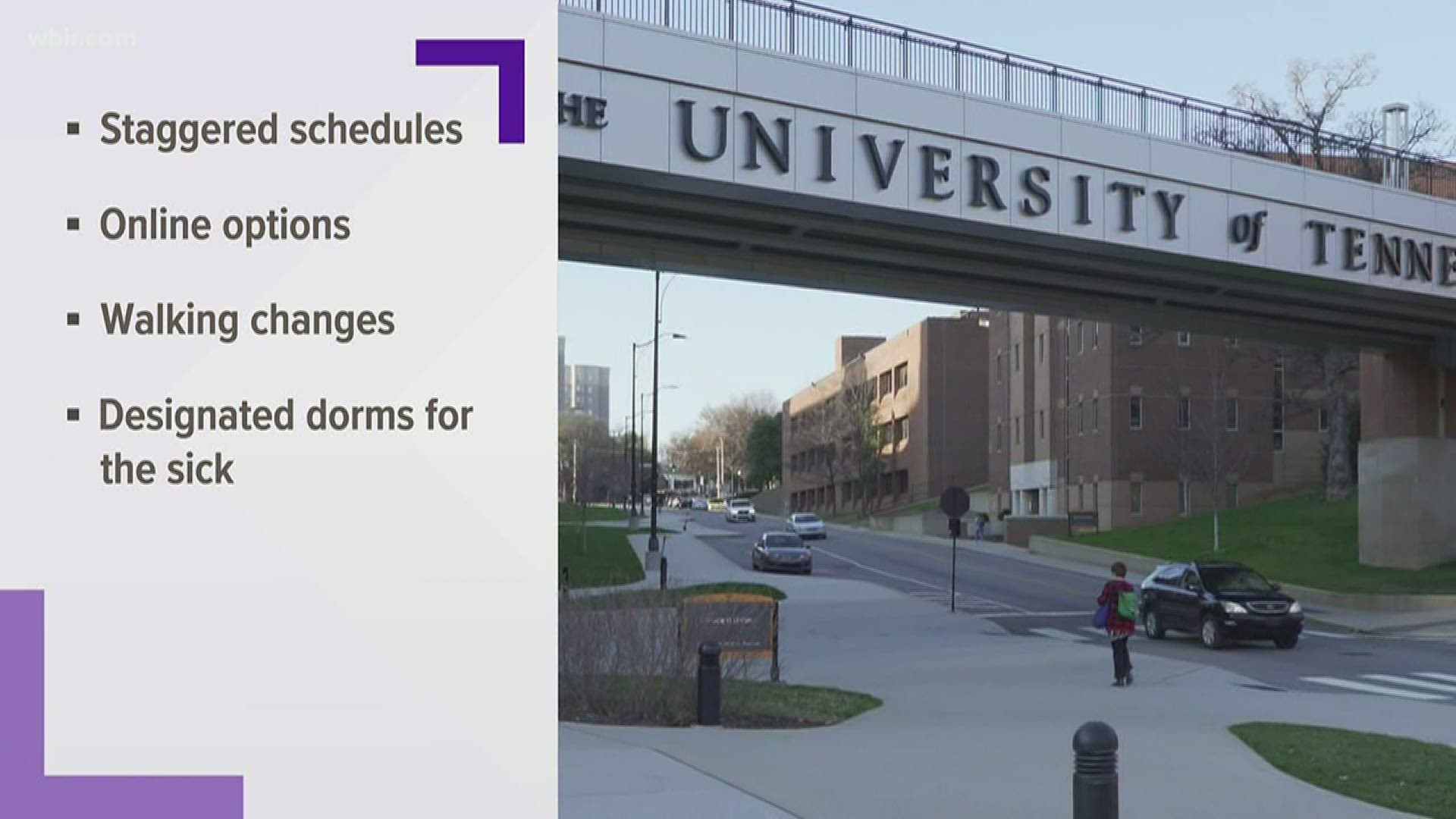KNOXVILLE, Tenn. — The University of Tennessee System’s COVID-19 task force has released a report of "best practices" for reopening campus in the fall.
The systemwide report advises UT's campuses on changes that could control the spread of COVID-19 when students return in the fall. It "re-imagines" several key areas of student life, such as dormitories, on-campus transit, dining halls and other facilities.
It also recommends campuses consider some changes to how classes are taught and required.
Here are some of the report's key points. The full report is available here.
Student life:
- Shared spaces like dormitories and dining halls should be "re-imagined" to follow CDC recommendations, but the changes could vary between each UT campus. "A campus-specific checklist could be developed to assist in assessing and altering facilities," the report reads.
- The way students walk to class could also change. The report said campuses should reduce crowding and create one-way paths by staggering class schedules, adding signage, and creating physical barriers to separate students during transit.
- The report said an "isolation dormitory" or other alternate living space should be designated or created to house infected students in isolation.
Classes:
The report said campuses "may consider re-imagining" classes. Ways campuses could do so include:
- A hybrid mode of learning that includes online options.
- Large classes offered entirely by online instruction or with alternating schedules for in-person instruction, allowing fewer students to be present in the same room.
- Smaller classes moved to larger classrooms.
- Staggered schedules and standard class times that are spaced further apart, further reducing crowding as students walk between their classes.
- Some courses could involve face-to-face group work between students. In those cases, the report said students should be placed in "cohorts" that stay the same throughout the class, so groups won't mix in-person often.
- If a vulnerable student can't safely take a class necessary for their major, campuses should consider eliminating or deferring the requirement for that student.
- Campuses should consider the risk status of faculty and teaching assistants when making decisions on how those faculty members will instruct students.
Student transitions between home and campus:
- Students should be encouraged to remain on campus for as much of the year as possible.
- Dates for moving into resident halls should be staggered to reduce density during this period.
- Policies should be developed to manage student travel off campus, including returning home. These policies may include notification of campus authorities for health tracking reasons, screening for infection, testing for infection, and quarantine upon return.
- International travel and travel to areas with a significant burden of COVID-19 in the community may be restricted or "result in more stringent measures."
- Campuses should consider eliminating breaks to "compress" semesters. The report said altering start and end dates for other parts of the academic calendar may need "further consideration."
- Policies should be developed to monitor visitation by parents, visiting professors, campus tours, and other visitors. These policies should be flexible enough to account for different levels of community or on-campus transmission of COVID-19.
Other considerations in the report include educating students and other community members on COVID-19, assessing large events and possibly bringing them online, and developing new health plans for student athletes.
Carson-Newman University in Jefferson City is also preparing for students to return to campus in the fall. University President Charles Fowler said officials are developing new protocols for cleaning and disinfecting.
Crews are also renovating and updating dorms. Fowler also said routines will involve social distancing, masks, temperature checks and hand sanitizing.
Maryville College in Maryville said it's cautiously optimistic it will hold in-person classes and open dorms again in the fall.
A task force will meet this month and make recommendations, procedures and policies for the fall. The college hopes to release a broad plan for the fall semester in early to mid-June, with more specific details announced over the summer.

